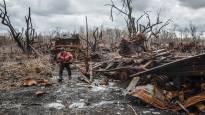War destroys life, whether it is people, animals or nature.
President of Ukraine Volodymyr Zelenskyi took the initiative last year to establish an international group to investigate the environmental damage caused by the war.
A group of European politicians visited the site at the beginning of February to see the ruins of the war.
– We are doing this for the good of the Ukrainian people. We think about people’s health, the chairman of the international group Margot Wallström said in an interview with in Stockholm.
Wallström is a long-standing social democrat, Sweden’s former foreign minister, former EU commissioner and former vice-president of the EU Commission. interviewed Wallström on Wednesday.
Wallström emphasized that Zelenskyi’s environmental work in the middle of the war is groundbreaking. He believes that the work will lead to the creation of international standards for measuring the environmental damage of war.
– It is very unusual to raise the question of the environmental effects of war when war is still being used. Environmental issues are also part of Zelensky’s peace plan, Wallström pointed out.
“The biggest danger is landminesâ€
Wallström highlighted three environmentally dangerous issues in Ukraine in particular: nuclear power plants, the destruction caused by the explosion of the Kahovka dam, and mines.
– I would say that the most urgent problem is mines. They are about life and death.
Various organizations already warned last summer, that the most landmines in the world have been dug into the soil of Ukraine. There are also unexploded bombs and artillery shells.
Wallström estimates that if Ukraine continues to clear mines at the current rate, it will take hundreds of years to remove all mines from the ground.
– They would like to do it in ten years! The fastest way would be to clear out the top layer of the soil. But that probably doesn’t make the most sense in a country like Ukraine that depends on fertile soil, Wallström said.
He emphasized that the environment must also be considered in demining.
The group of 12 European politicians led by him is looking for cooperation organizations for Ukraine that could finance demining and donate tools for it. The group cooperates with the Ministry of the Environment of Ukraine and other authorities.
There are no easy solutions.
– It is said that Ukraine would manage to clear the mines in 70 years. In that time, a new forest would have already grown on top of the last mines on the ground, and it might make the area unusable forever.
“Russia must payâ€
Wallström’s international environmental group published its report at the beginning of February. It contains 50 recommendations, the purpose of which is to document the environmental damage caused by the war in Ukraine, hold Russia accountable for it, and encourage Ukraine to adopt environmentally friendly solutions in reconstruction.
– The administration has urged people to take pictures of environmental damage and report on it. Ukrainians are already doing it. They have sent thousands of reports, Wallström said.
He thought it was very important that Russia be held accountable for the destruction it caused. However, he assured that the members of the group are realists.
– It will take a long time for the president of Russia Vladimir Putin or any of the Russian leaders will be put behind bars. They will use all means to get out of fear.
– We can’t just say we give up and let the Russians do what they want. We have to make sure that the legal processes move forward. And that Russia will pay, Wallström said.
According to Wallström, Europe could use the funds frozen from Russia for the good of Ukraine’s environment. The EU Commission outlined in December that the proceeds of the frozen funds of around 200 billion euros should be used for the reconstruction of Ukraine.
“Ukraine’s fate is our fate.â€
Wallström’s group visited Kyiv, Ukraine, and the area of the Chernobyl nuclear power plant. The group traveled by bus and thus saw the devastation caused by the war to forestry and agriculture on the way.
Wallström repeated several times in the interview that Ukraine is dependent on agriculture. But the world also depends on Ukrainian agriculture.
– Ukraine’s fate is our fate, Wallström formulated.
Before the war, Ukraine was the third largest grain producer in the world, Wallström pointed out. When Ukraine’s grain shipments in the Black Sea were interrupted at the beginning of the war, the effects were felt even in African countries.
In the video below, you can see how the TÅ¡nerobyl nuclear power plant area looks today. The Chernobyl nuclear reactor was destroyed in 1986. The group led by Walström visited there on February 10.
The international group led by Wallström includes 12 people, including the EU’s Lithuanian Commissioner for the Environment Virginijus SinkeviÄ ius and Vice-President of the European Parliament Heidi Hautala.
Source: Reuters
